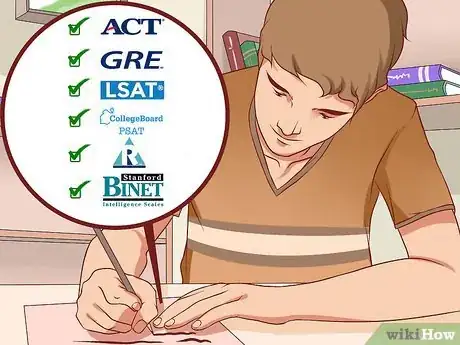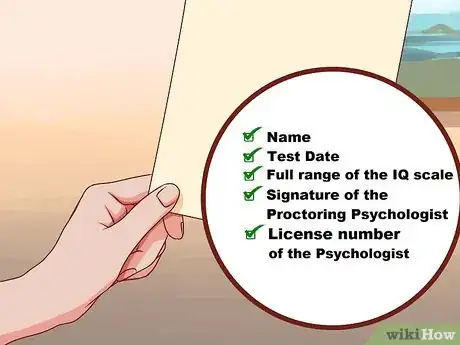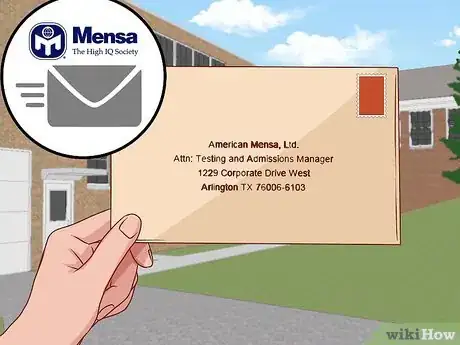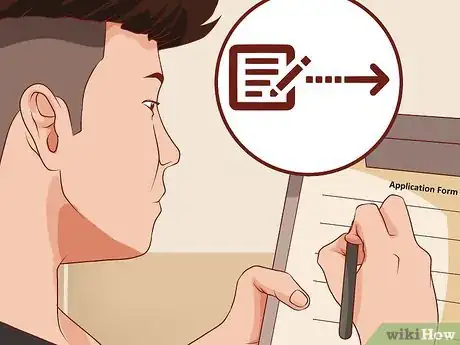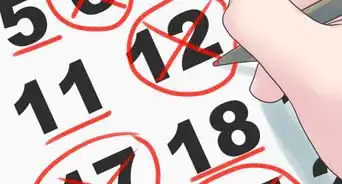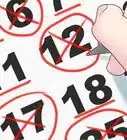This article was co-authored by wikiHow Staff. Our trained team of editors and researchers validate articles for accuracy and comprehensiveness. wikiHow's Content Management Team carefully monitors the work from our editorial staff to ensure that each article is backed by trusted research and meets our high quality standards.
There are 21 references cited in this article, which can be found at the bottom of the page.
This article has been viewed 63,529 times.
Learn more...
Mensa is a high IQ society that is open to all people who are able to prove that they are in the top two percentile of accepted intelligence tests. Some of these tests include the SAT, ACT, GRE, and LSAT.[1] Lacking these, you will need to take the supervised IQ test offered by Mensa International at an approved testing site. To pass this test and join the ranks of the intelligensia, you'll need to give yourself every advantage. Study, get plenty of rest, and make use of test taking techniques to give yourself the best chance of becoming a Mensan possible.
Steps
Submitting Old Tests
-
1Determine whether your old test qualifies. Various intelligence tests administered throughout your schooling are acceptable to Mensa as proof of your superior intelligence. Many supervised intelligence tests are accepted by Mensa, however, each document must be individually assessed by a Mensa psychologist.[2] A short list of accepted tests include:
-
2Include necessary documentation for school administered tests. You'll have to get a letter from your school on school letterhead that's been signed by an approved representative to prove that your test was properly administered. If your test was administered by a psychologist, have her sign the original or a notarized copy of your reported test results.
- A school administrator can sign in place of a school psychologist, if necessary.
- An official transcript reflecting your test score that has your school's seal stamped on it or a transcript enclosed inside an school envelope is also acceptable.[5]
Advertisement -
3Follow Mensa guidelines for privately administered tests. These tests should have been administered by an appropriate proctor, in most cases a psychologist, and will require that professional's documentation on official letterhead. In addition to this, you will be expected to include documents containing:
- Your name
- The testing date
- The full range of the IQ scale
- The percentile you were ranked at
- The original signature of the proctoring psychologist
- The license number of the psychologist
-
4
-
5Send your documents to Mensa for evaluation. You might be able to instruct your school or psychologist to send your test results directly to Mensa for evaluation. Other testing agencies might only send your test results directly to you to protect your privacy. If this is the case for your test results, send the results unopened to the following address:
American Mensa, Ltd.
Attn: Testing and Admissions Manager
1229 Corporate Drive West
Arlington TX 76006-6103- Original documents you want returned should be sent with a self-addressed, stamped envelope.
- Non-original documents must be notarized as copies of the original document.
-
6Wait patiently to hear if your test results were accepted. Depending on your evidence, the time of year you send your evidence in, and other factors, your evaluation will take between two and four weeks. If five weeks pass without notification, you should contact the testing and admissions department through the Mensa website.
Studying for the Test
-
1Sign up in advance. You'll want to give yourself ample time to prepare for the test, so when signing up for your Mensa assessment, choose a date that meets your study needs. Comparable academic tests, like the GRE (Graduate Record Examination), generally takes well-studied students one month of study to adequately prepare, but can require as many as six months for those who are out of practice with the material or test taking.[8]
-
2Take the practice test and do the online evaluation. Practice tests are available in many countries, and these will inform you of the main areas the actual test will target. Take note of these areas so that you can direct your studies later more effectively. You can also get a general evaluation of how well you will do by taking the online Mensa evaluation at:
- https://www.mensa.org/workout
- NOTE: in many countries, practice testing is available both online and in print. This will, however, depend on your home country, and should be further investigated at the Mensa international homepage.[9]
-
3Break up your study times. You can improve your long term recall and hopefully your Mensa test score by taking short breaks between periods of intensive study.[10] Try to spend about 20 minutes focused on the thing you are studying and then allow your mind to rest for 5 - 10 minutes. During your break you might:
-
4Investigate test test trends. The first portion of the test, the Wonderlic, will require you to answer 50 questions in 12 minutes or less. The second test, the Mensa Admission Test, has multiple sections totaling in over 100 questions. Knowing how long you have on each section and what to expect will prevent you from wasting precious seconds puzzling out directions or reading unnecessary information. Generally, your test will include:
-
5Prioritize your worst subjects when studying. If, after the practice test and Mensa workout, you notice that your mathematics scores are solid but your linguistic skills wanting, you should arrange your study schedule to buff up your weak subjects.[13] As an example, you might study for an hour and a half every morning, spending your time accordingly:
- First round of study (20 minutes): language practice
- 10 minute break
- Second round (20 minutes): language practice continued
- 5 minute break
- Third round (10 minute): math review
- 5 minute break
- Fourth round (20 minutes): science review
-
6Start studying sooner than later. Cramming for a test last minute can contribute to your overall anxiety which, in turn, can lead to less restful sleep. If you plan on reviewing your trouble areas the night before your test, be sure you get plenty of sleep, as sleep deprivation will impeded your learning.[14]
-
7Use mnemonic devices. Mnemonic devices are word associations, rhymes, or initialisms/acronyms that help you to remember something.[15] An example of this that you may have learned is the name "Roy G Biv," which stands for the color spectrum: Red orange yellow Green Blue indigo violet.
Readying Your Body
-
1
-
2Plan a pre-exam routine. Having a routine can make the day of your test feel like any other, which can help reduce test anxiety and stress. Be consistent with your routine and eventually your routine will become a comforting series of events.
- Your routine shouldn't be shorter than 10 minutes, but shouldn't be too much longer than 30 minutes.
- You can make a mental checklist of things you need part of your routine, which will help you remember important items on the day of your test.[18]
-
3Eat a healthy meal before your test. Hunger can make you distracted, which can hurt your performance on the test.[19] Protein rich foods, like eggs, nuts, yogurt, and cheese, can improve your mental sharpness. Where carbs are concerned, stick to complex carbs, like whole grain products, brown rice, and whole rye to name a few. These will keep your glucose levels stable throughout the day and help you do your best on the test.[20]
-
4Eat in moderation. Eating too much can leave you feeling drowsy or lethargic, both physically and mentally. This can lead to lower test scores than you would expect. To prevent yourself from overeating, you might want to plan out several healthy snack leading up to your test, like some fruit, whole grain toast, and eggs for breakfast, followed by a granola bar snack an hour before your noontime test.
-
5Dress comfortably. An itchy tag or constricting waist band might also distract you while test taking. Remember, this test is about your mental ability, not your fashion ability. Choose clothing that breathes well and fits comfortably.
- You may want to dress in layers in case your testing location has poor temperature control. Even in the summer, sub-arctic AC temps can lead to discomfort and lower scores.
-
6Exercise before your test. Be careful not to overdo it! Fatigue can hurt your test taking abilities, but light exercise before your test can work out jitters and improve the flow of oxygen to your brain. If you don't exercise regularly, some simple exercise you can do before your Mensa test might include:
Taking the Test
-
1Arrive early. Tests are anxiety inducing enough, you don't want to add more to yourself by running behind on the day your test is scheduled. Running into the test room, your heart and mind racing, will likely put you in a less than optimal mental state for test taking.
- Visit your testing location prior to the day of your test to squash any pesky worries that you won't be able to find it the day of.
-
2Skip questions when necessary. Though Mensa proctors will tell you that test questions get harder as your progress through the assessment and not to skip ahead, wasting unnecessary time on a question you don't know will make it difficult for you to answer later questions you do know.[21]
-
3Chew gum. Chewing gum raises alertness, speeds your reaction times, and allows you to remember new information at a quicker rate.[22] Especially if you have difficult staying awake during a test, you should consider walking into your test already chewing a stick of gum.
-
4Choose peppermint flavor for improved performance. Peppermint can invigorate your mind, sharpen your attention span, and improve your memory.[23] Even if you hate peppermint candy, you can make use of this cognitive enhancer by putting a dab of peppermint essential oil on your wrist or shirt sleeve. That way you can take a whiff periodically to enjoy its benefits.[24]
-
5Guard your minutes by keeping track of time. One of the most challenging aspects of the Mensa test is the short time limit in which you will be expected to complete it. Keep an eye on the clock to keep yourself on task, and be quick to cut your losses and move on if any one section is taking too long.
-
6Await your test. Your test results will be sent to you two to three weeks following your test, but this time may take longer depending on the number of applicants and other factors.[25] Test results cannot be conveyed over the phone, but if you write a simple request for results to be sent to you via fax or email, including your name, email, and signature, Mensa shall do so when finished scoring your test. These requests should be sent to:
Admissions Department
American Mensa, Ltd.
1229 Corporate Dr W
Arlington TX 76006-6103
Community Q&A
-
QuestionDoes Mensa still have an application? I cannot find it on the website.
 Community AnswerClick the "Create Account & Submit Scores" button on the Mensa website under the section "Submit Qualifying Testing." Then create an account and pay the score evaluation fee, you do not need to attach a file. You will get an email saying that Mensa has received your application and that you will need to mail them your documentation/test scores.
Community AnswerClick the "Create Account & Submit Scores" button on the Mensa website under the section "Submit Qualifying Testing." Then create an account and pay the score evaluation fee, you do not need to attach a file. You will get an email saying that Mensa has received your application and that you will need to mail them your documentation/test scores. -
QuestionCan I use a score sheet from the CogAT as documentation?
 Community AnswerYes, you can. Your composite SAS just needs to be 132 or higher for you to qualify.
Community AnswerYes, you can. Your composite SAS just needs to be 132 or higher for you to qualify.
Warnings
- If you get accepted and decide to join, to fully become a member you'll have to pay membership dues.⧼thumbs_response⧽
References
- ↑ http://www.us.mensa.org/join/testscores/qualifyingscorefaq/
- ↑ http://www.us.mensa.org/AML/?LinkServID=005EB3F7-B83A-44BA-B4FFD5114A1AC31D
- ↑ http://www.us.mensa.org/join/testscores/qualifyingscorefaq/
- ↑ http://www.us.mensa.org/AML/?LinkServID=005EB3F7-B83A-44BA-B4FFD5114A1AC31D
- ↑ http://www.us.mensa.org/join/testscores/qualifyingscorefaq/
- ↑ http://www.us.mensa.org/join/testscores/
- ↑ https://www.us.mensa.org/join/testscores/print-an-application/?PROMOCODE=
- ↑ http://magoosh.com/gre/2012/how-long-should-i-study-for-the-gre/
- ↑ https://www.mensa.org/join-mensa
- ↑ http://www.theguardian.com/technology/2010/may/30/paul-kelley-monkseaton-space-learning
- ↑ http://www.psmag.com/books-and-culture/i-failed-a-mensa-test-twice-59632
- ↑ http://metro.co.uk/2009/10/14/how-do-you-get-into-mensa-488856/
- ↑ http://www.explainthatstuff.com/howtopassexams.html
- ↑ http://newsroom.ucla.edu/releases/cramming-for-a-test-don-t-do-it-237733
- ↑ http://www.thefreedictionary.com/mnemonic
- ↑ http://www.webmd.com/sleep-disorders/excessive-sleepiness-10/10-results-sleep-loss
- ↑ http://www.webmd.com/sleep-disorders/excessive-sleepiness-10/10-results-sleep-loss?page=2
- ↑ http://www.mentalgamecoach.com/articles/BeatingExamAnxiety.html
- ↑ http://www.webmd.com/food-recipes/healthy-foods-eat-brain-power?page=3
- ↑ http://www.webmd.com/food-recipes/healthy-foods-eat-brain-power?page=2
- ↑ http://www.psmag.com/books-and-culture/i-failed-a-mensa-test-twice-59632
- ↑ https://www.psychologytoday.com/blog/your-brain-food/201208/gum-chewing-is-good-the-brain
- ↑ http://naturalsociety.com/mint-scent-improve-brain-cognition-memory/
- ↑ http://jass.neuro.wisc.edu/2012/01/Lab%20603%20Group%205%20The%20Effect%20of%20Peppermint%20on%20Memory%20Performance.pdf
- ↑ http://ocmensa.org/join/faq/
About This Article
To join Mensa, sign up for their test a few months in advance so you will have enough time to study. Be sure to show up early on your test day to reduce stress. When you're testing, keep track of how much time you have left to help you decide whether a hard question is worth the time. Feel free to skip questions you don't know well, but keep in mind that the questions do get harder as you progress. For tips on how to study for the test, keep reading!
